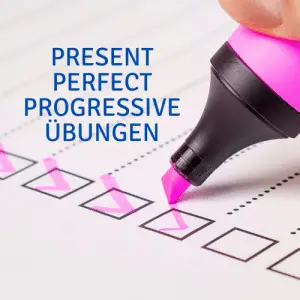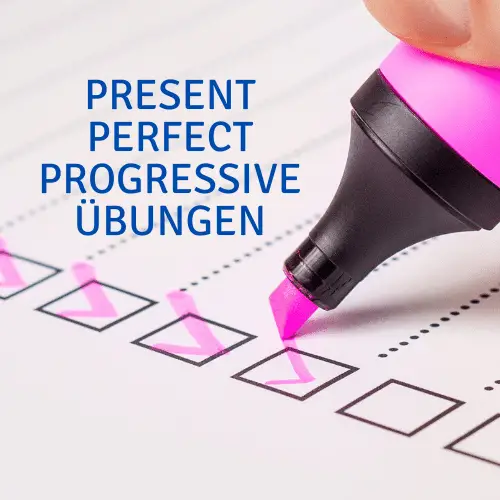Present Perfect Progressive Übungen
Verwendung: Ist eine Form der Vergangenheit und wird verwendet, um
- die Dauer der Handlung hervorzuheben.
- zu betonen, dass die Handlung noch andauert.
Present Perfect Progressive : Regeln und Verwendung
The present perfect simple with “since” or “for”:
Fill in the correct form of the verb and “for” or “since”.

| Present Perfect Simple: have / has + past participle
Present Perfect Progressive: have / has + been + ing-form for: a period of time ——————— // since: a point of time ♦ |
Text Version + Solutions:
- I haven’t seen (not see) you for a very long time.
- Since when have you had (you, have) this book?
- My mother has done (do) the shopping since 9 o’clock.
- Mr Fisher has been (be) in hospital for over a month.
- School has changed (change) a lot since my school time.
- My friend hasn’t spoken (not speak) to me since our meeting.
- Peter has stayed (stay) in bed for eight hours.
- My grandmother hasn’t eaten (not eat) anything for days.
- We have had (have) rainy weather since Monday.
- This big tree has been (be) here for 200 years.
- The men have been fishing (fishing) for two hours.
- We have been waiting (wait) for you since breakfast.
- The police have been looking (look) for the thieves for five days.
- Mrs Winter has been working (work) in her office since 9 o’clock.
- The service has been trying (try) to open that door for an hour.
- I have been reading (read) this exciting book since the beginning of my holiday.
- That man has been standing (stand) there for twenty minutes.
- The Walkers have been living (live) in Brighton since 1999.
- The kids have been swimming (swim) for half an hour.
- It has been raining (rain) since the morning.
Exercise – Fill in the present perfect progressive
- Where is Paula? She _ (go) on holiday [Anmerkung: Sie ist noch immer dort]
- Poor John! He _ (lie) in bed for two days now and is still ill. [Anmerkung: Er ist noch immer krank und liegt noch immer im Bett]
- He (stay) at the Magic Life Club for two weeks. [Anmerkung: er ist noch immer dort]
- They (eat) lunch since twelve o’clock. I hope they will soon finish.
- They __ (run) all morning. Now they are tired.
- The climbers ________________________ (try) to find their way for hours because they have lost their way in the snowstorm.
- People ______ (look) for the children in the wood, but they still have been unable to find them.
- I (live) in Bad Vöslau for 10 years now. But soon I am going to move to Vienna. [Anmerkung: Im Moment leb ich ja noch immer dort ]
- The painter ________________________ (paint) the house for weeks. He will do the last wall tomorrow.
- Recently [in letzter Zeit], you _________________________ (smoke) way too much. You should smoke less.
- My dad ______ (work) all day long. And he won’t be home before 10pm.
- I ______ (clean) the windows. So far I have cleaned six. [Anmerkung: du putzt noch immer!]
- How long ___________you_______________ (read) this book? For two weeks now! [Anmerkung: du liest noch immer]
- How long ____________she______________ (go) to school? For seven years now. [Anmerkung: sie geht ja immer noch in die Schule]
- How long ____________they__________________ (live) in Salzburg?
[Anmerkung: sie leben noch immer dort ]
Lösung:
- has been going
- has been lying
- has been staying
- have been eating
- have been running
- have been trying
- have been looking
- have been living
- has been painting
- have been smoking
- has been working
- have been cleaning
- have you been reading
- has she been going
- have they been living
